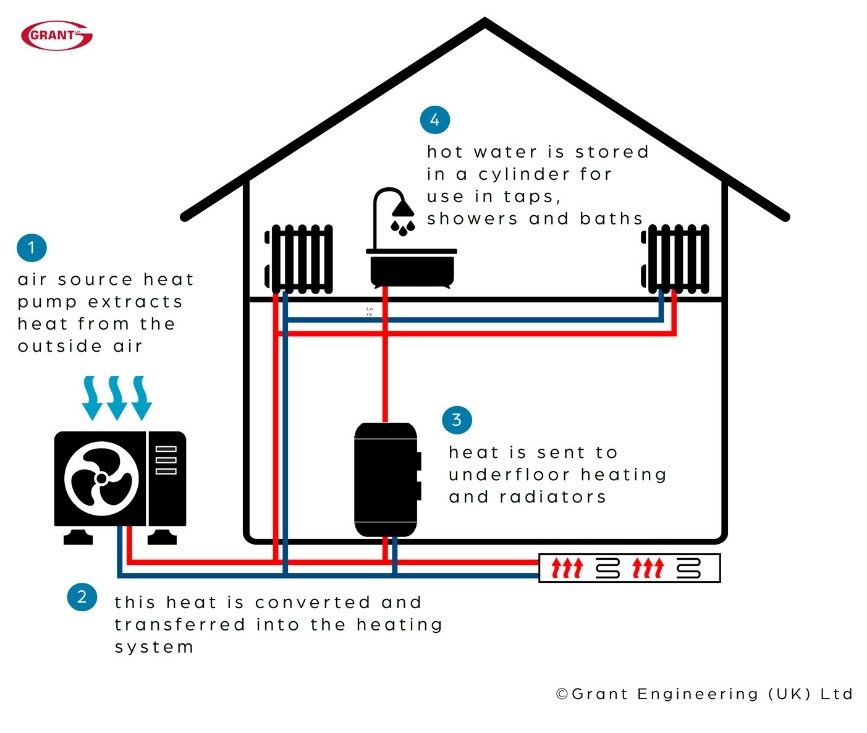Is an air source heat pump right for your home?
There are a lot of conversations taking place about low carbon heating with technologies, such as air source heat pumps, at the forefront of discussions. What is a heat pump? How do they work? Is a heat pump right for you? Let us help you by answering these questions and other heat pump FAQs in this blog.
What is a heat pump?
A good place to start is by explaining what a heat pump is and how they operate. The first thing to point out is there are two main types of heat pump – ground source heat pumps and air source heat pumps. In this article, we are going to focus on the latter and principally air-to-water heat pumps because these are products that Shelford Heating specify and install.
An ‘air-to-water’ heat pump captures the heat energy which is in the air outside and transfers this into water. This water then passes through a ‘wet’ heating system, flowing through radiators and/or underfloor heating pipework to warm up your rooms. In addition, the water contents in a cylinder will also be heated up to provide hot water to your taps. A core element of a heat pump’s operation is its use of a refrigerant, typically R32 or R290 refrigerant, and this enters a cycle of being a gas then a liquid and then back to a gas, playing an important role in converting the heat energy in the outside air into energy that can be used within a central heating system.
Below is an infographic which shows how an works to sustainably heat a home and fulfil its hot water demand.

How does a heat pump differ to a conventional heating system?
It is important to understand that a heat pump system has a number of distinct differences compared to a traditional central heating system, such as a gas or oil boiler. Air source heat pumps operate as ‘low temperature heating systems’ which means the water flowing through the heat emitters is typically between 35ºC-55ºC compared to a gas boiler central heating system which would have a water flow temperature of nearer 70ºC. Operating as a low temperature system allows a heat pump to be incredibly efficient. It is important to not misunderstand this ‘low’ temperature for being unable to keep your rooms up to temperature – provided your heat emitters have sufficient surface area (which would be calculated during the design phase of a heat pump installation), the system will be more than capable of meeting your temperature preferences and desired settings.
As part of being a low temperature system, radiators can feel cooler to the touch when connected to a heat pump but be assured, this is correct and nothing to worry about. Heat pumps are also designed to operate throughout the day and should not be switched off – instead, by letting a heat pump work within a framework of energised and setback phases, the system will be able to achieve maximum efficiency while also keeping your home cosy and warm. This is why correctly controlling a heat pump system is so crucial for its efficient operation and the team at Shelford Heating are on hand to help customers with this.
If you are interested in reading more about heat pumps, Grant UK have shared some useful blogs on their website about how to control a heat pump and heat pump myths and misconceptions
What types of homes are suitable for a heat pump?
Air source heat pumps can be the solution to heating lots of different styles of properties, not just new build homes. From smaller properties and flats through to extended homes and larger properties, a heat pump can keep all of these warm provided the system is correctly designed, specified and installed. Firstly, the insulation levels of a property are key because a poorly insulated home will lose heat faster than a heat pump is able to generate warmth. This is why measures such as roof or wall insulation or fitting double or triple glazed windows can sometimes be recommended for homes before they consider a heat pump.
Larger homes or those which have high occupancy levels will have a higher demand for space heating and hot water production but a heat pump can still be an option. Larger, twin fan heat pumps are designed for homes with larger heating demands and it is also possible to install and connect more than one heat pump to a single system. So, no matter what size home you have, a low carbon heat pump could be right for you – speak to a member of the team at Shelford Heating Ltd to discuss this more.
How to choose the right heat pump for your home
A heat pump installation is not the same as a conventional boiler installation so it is important that you work closely with your installer, such as Shelford Heating, to ensure your requirements are clearly identified so that the heat pump system can be correctly designed to fulfil your household’s space heating and hot water demand.
While every heat pump installation is different, the key stages for selecting the right heat pump for your home will include:
- Complete a thorough assessment of your property, calculating its heat loss and the amount of energy that will be needed to keep your rooms up to the desired temperature and to meet the hot water demand. This stage will be carried out by Shelford Heating who will provide you with a quotation for a new heating system – in addition, Grant UK’s in-house Design Team can support with the heat loss calculations and specification of the system.
- Ensure your home is suitably energy efficient for a heat pump – as we touched on earlier, for some homes, it may be necessary to improve their fabric efficiency through measures such as insulation or improved window glazing. A lot of homes will already have sufficient insulation measures installed but any steps you can take to reduce the amount of heat escaping through your roof, walls and windows, the more efficient your heat pump will be able to operate.
- Select the right size and model of heat pump and heat emitters – when Shelford Heating have calculated your property’s heating demand and heat loss, they will then be able to recommend the best size of heat pump that you will need. This could be a small unit such as the Aerona 290 4kW heat pump or an Aerona³ 17kW heat pump which has a larger heating output. Shelford Heating will also be able to confirm whether you can use your existing radiators or whether they will need to be upgraded.
What are Grant heat pumps?
Grant UK, whose headquarters are based in Wiltshire, first launched a range of air source heat pumps over fifteen years ago. Today, as a result of their ongoing commitment to continuous product development, Grant air source heat pumps comprise of two ranges – the Aerona³ heat pumps and the Aerona 290 heat pumps. Both the Aerona³ and Aerona 290 air source heat pumps offer a wide range of benefits including:
- All Grant heat pumps are MCS approved and eligible for a £7,500 grant available through the Government’s Boiler Upgrade Scheme
- All Grant heat pumps achieve excellent efficiencies with every Aerona³ and Aerona 290 heat pump model having an ErP energy rating of A+++ (at 35ºC flow temperature)
- All Grant heat pumps can be controlled and monitored with the latest generation of controls, being compatible with the Aerona Smart Heat Pump System Controller which can maximise system efficiency and enable remote control and monitoring of your heat pump (when installed alongside the Aerona Smart WiFi Hub)
- All Grant heat pumps come with a 7 year guarantee when installed Shelford Heating who are G1 Installers, having completed heat pump product training at Grant UK’s Training Academy.
Not only do Grant UK supply award-winning heat pumps, but they also supply hot water cylinders, underfloor heating systems, aluminium radiators and solar thermal systems to complete the system.
You can view on their website. Grant UK
Are you interested in taking the next steps towards installing an air source heat pump in your home? Then contact Shelford Heating today!





